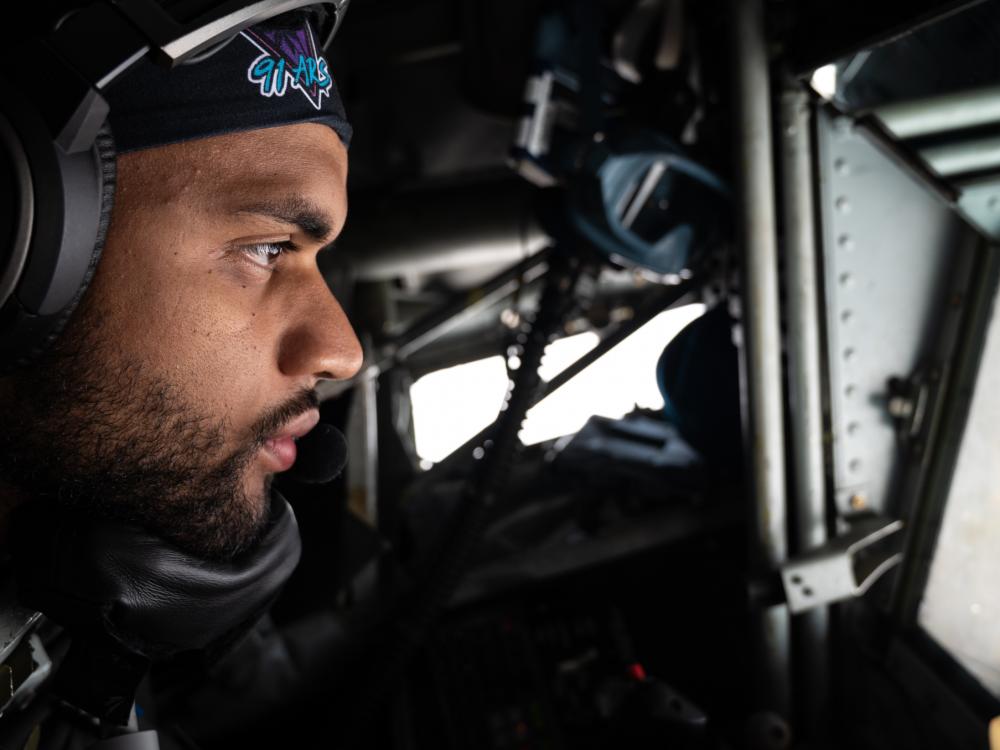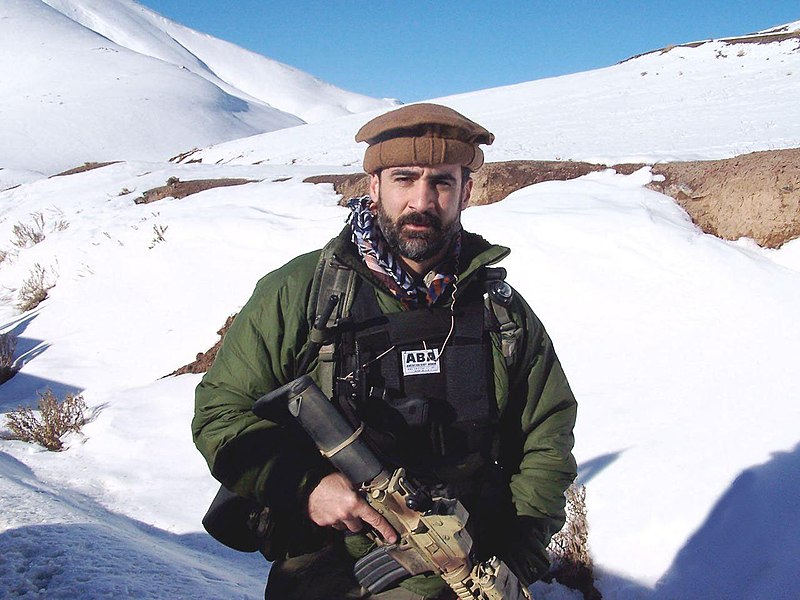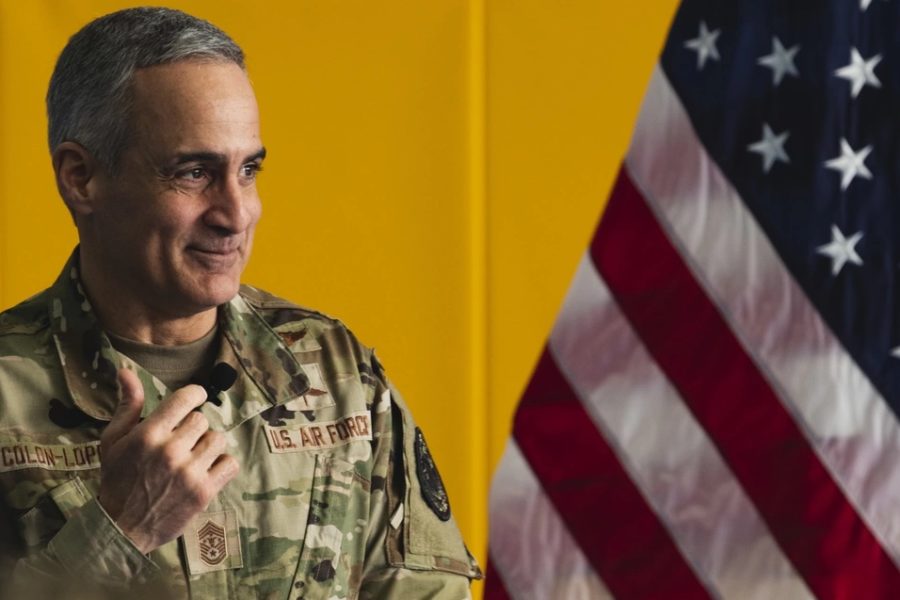The most senior enlisted service member stamped down on the push to allow Airmen and Guardians to wear beards in uniform without a waiver, saying beards don’t contribute to military preparedness and the push could have a negative effect on discipline.
“If you want to look cute with your skinny jeans and your beard, by all means, do it someplace else,” Senior Enlisted Advisor to the Chairman of the Joint Chiefs of Staff Ramón Colón-López said during a ”Coffee Talk” Facebook chat streamed live from the AFA Warfare Symposium on March 8. “But quit wasting our time on something that doesn’t have anything to do with kicking the enemy’s ass.”
Colón-López was joined by Chief Master Sergeant of the Air Force JoAnne S. Bass and Chief Master Sergeant of the Space Force Roger A. Towberman, who expressed similar views.
“From a fashion perspective, it’s a very silly thing to worry about,” said Towberman. “We’re not here to be fashionable.”
A Hairy History
Beards are again a sensitive topic in the Air Force. Decades after the Air Force imposed a beard ban, the service recently began allowing religious exemptions for some Airmen and medical waivers for others.
Air Force medical research published in 2021 suggested the beard ban was discriminatory toward Black Airmen, who are more likely to suffer from pseudofolliculitis barbae, a skin condition, also known as razor bumps, caused by ingrown hairs that makes shaving painful and even scarring if skin is not given a chance to heal.
Researchers found that Airmen with shaving waivers took longer to earn promotions and often could not land high-profile positions as recruiters, military training instructors, Honor Guard members, or positions on the Thunderbirds flight demonstration team.
“[T]he promotion system is not necessarily inherently racially biased, but instead biased against the presence of facial hair which will likely always affect the promotions of Blacks/African-Americans disproportionately because of the relatively higher need for shaving waivers in this population,” the study said.
Bass said she wants to eliminate discriminatory policies against Airmen with shaving waivers. Her team repealed policies that had barred bearded Airmen and Guardians from serving in some positions and they made it easier to qualify for beard waivers. Bass said she is aware of the stigma against facial hair, and in a December Facebook post wrote about her desire to erase that stigma.

Yet Airmen and Guardians continue to press for a rule change on social media forums like the Air Force subreddit and Facebook’s Air Force amn/nco/snco page, where commenters frequently question the need the beard ban in the first place. Military leaders often claim that facial hair disrupts the seal of a gas mask or oxygen mask, though one Air Force doctor has found no direct scientific evidence to support the claim.
“It’s an unsubstantiated claim,” Lt. Col. Simon Ritchie, the dermatologist who led the 2021 study on beards in the Air Force, told Task & Purpose in May. Beard opponents “may have anecdotal evidence of one to five people who they see fail the fit test,” he said. But “that can’t be extrapolated to hundreds of thousands of Airmen.”
Fellow NATO nations Canada, Germany, and Norway allow beards and show no direct evidence that facial hair disrupts gas mask seals, said Ritchie, who was stationed in Germany at the time. The nearest thing to direct scientific evidence he could find, he said, was a 2018 study showing that 98 percent of study participants who had an eighth-inch of beard achieved acceptable fits on civilian half-face negative-pressure respirators, which Ritchie said are comparable to the M-50 gas masks used in the military today.
Ritchie told Task & Purpose at the time that the Air Force would need only a small study—perhaps 100 to 150 participants—to settle the issue one way or another. But Towberman and Colón-López seemed uninterested in pursuing broad acceptance of beards.
“I really feel pretty comfortable” with the policy as it stands, Towberman said. “It feels like we’re accomplishing what we needed to. I shouldn’t be discriminated against because of a glasses prescription, [and beards are similar]. So the medical requirement or the religious accommodation needed to be addressed and we’ve addressed it.”
‘Is There a Need?’
Colón-López was more blunt. A former pararescueman, he noted there was a “combat need” to grow beards in order to blend in with the local population in Afghanistan, but that need gradually fell away as the U.S. military established a longer-term presence there.
“You had GI-issue body armor, helmet, big American flag and a beard. Really? You blend in? So it became a stupid argument,” Colón-López said.
But in the 2016 book “Hammerhead Six”, Green Beret Capt. Ronald Fry wrote that beards were more than blending in—they were also an important means of gaining the respect of local elders.
“If I had shaved my beard, when I returned to duty in the Pech nobody would have talked to me,” Fry wrote. “The warrior king would have been reduced to juvenile status, and the respect that we were working so hard to gain would evaporate.”

Still, as the operator look—beard, baseball cap, Nine Line t-shirts—caught on, beards became “a badge of pride because of our ass-kicking track record downrange,” said Colón-López. His view: The calls for beards in the Air Force derive either from the desire to fit that style and look or from laziness and the desire to not shave.
“Now the question is: Do we really need to be discussing fashion, when we’re preparing after 20 years of war, to best an opponent that can potentially have the best of us?” he said. “Is there a need for a beard, other than personal comfort to not shave?”
Colón-López said he opposed religious exemptions to the beard rule when he worked for the Assistant Secretary of the Air Force for Manpower and Reserve Affairs.
“We call this a uniform,” he said on the Facebook chat, pointing to his chest. “And what does uni mean? One. And that is part of the expectation of people, to put their personality aside for the betterment of the team. … The more we start requesting ‘well, I want,’ we start losing sight of that discipline and that commonality that we have as warfighters.”
Ritchie, the dermatologist, disagreed in an interview with Air & Space Forces Magazine.
“This has never been about looking cute or about fashion, this has always been about eradicating every possible vestige of racial discrimination in the Air Force and also about allowing those with religious beliefs to express those while in uniform,” Ritchie said.
“We are forcing out talented Airmen (proven with data), we are not promoting our shaving waiver holders (proven with data), and because our waiver holders are predominantly Black this directly translates into racial discrimination,” he said.
Last year, former Chief Master Sergeant of the Air Force Kaleth Wright said in a panel discussion that he spent nearly his entire 32-year military career opposed to facial hair. “I had opportunities to hire all kinds of folks and I was adamant about not hiring somebody with a shaving waiver, just because I fell into that category of ‘this is Air Force policy, it’s not professional,’” he said. “I was willfully ignorant about the impact it was having on young Black men.”
But as CMSAF, Wright eventually changed his tune. At least one general officer shares Wright’s position. Maj. Gen. Kenneth Bibb, then-commander of the 18th Air Force, said on the same panel that for many years he did not want Airmen with shaving waivers to represent his wing or be in his Honor Guard.
“Man that hurts now that I think about the words that I said and the guidance that I gave,” said Bibb, now the deputy inspector general of the Air Force.
“I’ll be the first Airman to grow a beard” if the Air Force drops the ban, he said. “I think we have to take away the stigmatism that goes with this. Even if you change the rules, if we don’t see leaders that have beards,” the stigma will survive.
